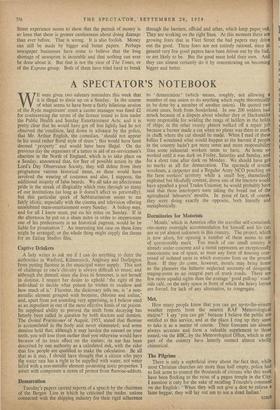Demarcation to ' demarcation ' (which means, roughly, not allowing
member of one union to do anything which ought theoretically to be done by a member of another union). He quoted two recent cases, both from Sunderland. In one 200 welders had struck because of a dispute about whether they or blacksmiths were responsible for welding the rungs of ladders in the holds of ships; in the other twenty platers walked off a repair job because a burner made a cut when no plater was there to mark in chalk where the cut should be made. When I read of these follies I wondered what would happen to the harvest if people in the country hadn't got more sense and more responsibility than some industrial workers seem to have. At home we worked until it was dark on Friday, Saturday and Sunday, and for a short time after dark on Monday. We should have got no marks at all for demarcation. The spectacle of several woodmen, a carpenter and a Regular Army NCO poaching on the farm workers' territory while a small boy, shamelessly exploited but blissfully content, drove one of the tractors would have appalled a good Trades Unionist; he would probably have said that these interlopers were taking the bread out of the agricultural labourers' mouths. In point of fact, of course, they were doing exactly the opposite, both literally and metaphorically.


































 Previous page
Previous page